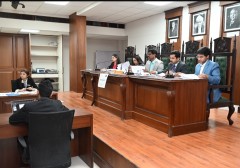- Indian Institute of Science launches 'Longevity India Initiative' to pioneer ageing research in India
- GD Goenka University’s School of Law Successfully Hosts 4th International Law and Technology Moot Court Competition
- Data Protection Dilemma: Analyzing the Veritas Cohesity Merger's Risks and Solutions
- 3 Questions from Aspiring Real Estate Professionals About Earning a Real Estate License in Michigan
- Alepo Technologies Successfully Deploys Advanced AAA Solution for VodafoneZiggo in Partnership with Nomios Group
- This April, Aravali Kitchen at Courtyard by Marriott Aravali Resort extends an invitation to Taste the Himachali Dham Special Dinner
- Aerospace Exchange Bolsters Offerings and Services to Streamline Civil and Military Aviation Part Procurement
- Sommet Education Unveils New Step in Strategic Digital Expansion with Online Executive Certificates
- LAUNCH OF THE BOOK - In The Woods - Oruku by Roma Dessai
- Neue Auctions' April 27th, Art in Bloom Auction Features Contemporary Art Glass, Paintings, more
- Viaante Recognized Among Top 20 IT Services Companies by DesignRush
- Times Prime's New Billboard at Mumbai Sea Link Proves Too Small to Contain Its Massive Membership Benefits
- Codilar To Showcase Award-Winning Digital Commerce Solutions At Seamless Middle East 2024
- 2024 Thailand Tourism Report Unveiled by Tourism.co.th
- This Earth Day, Fairmont Jaipur stands at the forefront of sustainable hospitality.
 Mail to a Friend Mail to a Friend |
|
     |
Heritage Xperiential Learning School helps students nurture a deeper connection with food - experiencing its journey from ‘Farm to Table’
Gurugram, 8th Oct 2021: Heritage Xperiential Learning School, known for its experiential learning pedagogy, recently launched a food-based expedition for its Class 5 students. Learning expeditions at Heritage are designed to allow for application of knowledge from multiple disciplines and usage of various skills, packing in experiences that make learning real for students. The ?I Am What I Eat? expedition explored the various aspects connected with food which ranged from studying the various components of food, deficiency diseases, and what comprises a balanced diet. It also introduced students to different types of food systems and farming practices like organic farming. They studied the different types of food preservation methods (ancient and modern) and compared traditional cooking methods with modern day fast cooking and processing methods to conclude for themselves which is healthier. They tried to understand the nature of soil and how its health impacts the quality of food and how composting is great practice to sustain the health of soil. The students went into the exploration of each of the above strands and created a website that captured their learning and also showcased many resources that they created and compiled like healthy recipes, analysis of their weekly diets, games and poems they created around the theme and also glimpses of the kitchen gardens that they nurtured in their homes.
The unique aspect about this expedition like all other expeditions at Heritage was that none of the above topics were taught only from the text book but real-life, hands-on experiences were built into the learning of each of these. Some of the experiences that students had included nurturing a kitchen garden in their home, identifying and creating healthy recipes and selecting cooking methods, cooking oils and utensils which they found to be healthier options explaining their reasons for choosing them. They learnt how composting is done and found answers to why composting is useful and how it compares with use of fertilizers. They traced the food history of their families by interacting with family members from different generations. Each section created a website to compile their learning and showcase the products created along the way. They used multiple resources to do their research on each of the topics and then the findings were presented and shared with the class where multiple discussions and debates helped consolidate their learnings.
The interdisciplinary nature of the expedition can be seen through the number of subject areas that were weaved into it. The science involved at different stages of farming, compost making and food preservation brought several concepts of life sciences to life. Balanced diet, nutrition and deficiency diseases were the other life science topics that were important parts of the expedition. Students also studied about the plant lifecycle and the process of photosynthesis during the expedition. The social science aspects of food were also uncovered where students traced how food habits have changed over generations and how food is part of festivals and celebrations and our cultural identity. Students used data analysis for recording and analyzing their own consumption of various components of food across a week and then learnt how to represent that using various types of graphs and charts like the pie chart. They also used their knowledge of various tools of digital design to share their findings as presentations or videos and a website to showcase all their learnings as the culmination product.
Other than the traditional subject areas students learnt a great way to work for the community through CSNF (Community supported Natural Farming) that ensures both a nutrient rich food supply and better income for the farmers choosing organic methods of farming. Working together as a team was essential for the success of the expedition as, other than the individual tasks, there were many group tasks and projects where different parts of the larger topic were researched and delved deeper into by group members and then learning was shared in small and large groups.
Talking about the Grade 5 expedition of ?I Am What I Eat?, Ms. Neena Kaul, Principal, Heritage Xperiential Learning School, said, \"We at Heritage believe in enabling and empowering students so the effort is always to simulate real-life where one does not apply knowledge in a compartmentalized manner and being able to transfer knowledge across situations and subjects is critical. The school is constantly working towards creating experiences that help students gain knowledge which is more personal and real to them through expeditions like these.?
Company :-Kaizzen
User :- Srishti Srivastav
Email :-srishti@kaizzencomm.com











